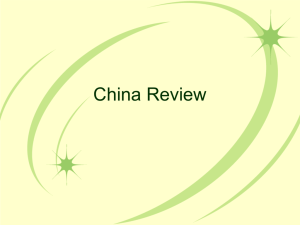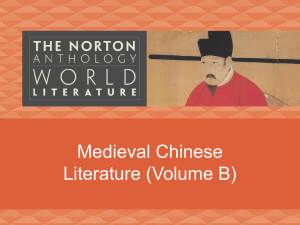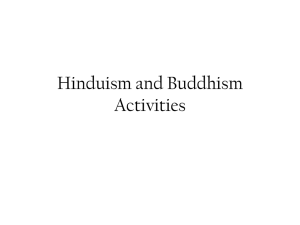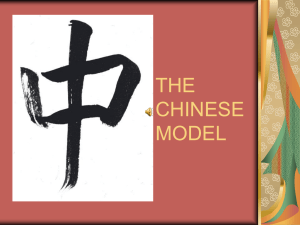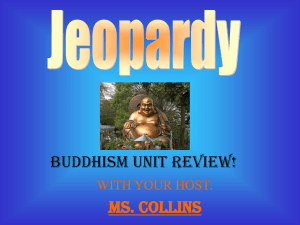Buddhism in China
advertisement
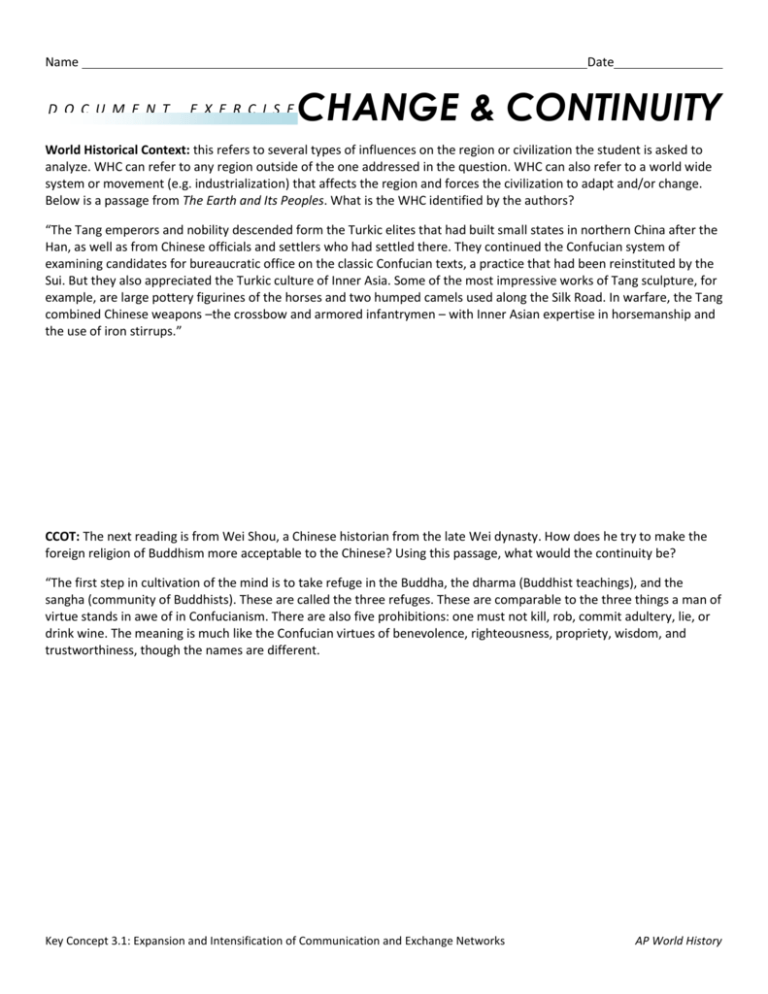
Name D O C U M E N T Date E X E R C I S E CHANGE & CONTINUITY World Historical Context: this refers to several types of influences on the region or civilization the student is asked to analyze. WHC can refer to any region outside of the one addressed in the question. WHC can also refer to a world wide system or movement (e.g. industrialization) that affects the region and forces the civilization to adapt and/or change. Below is a passage from The Earth and Its Peoples. What is the WHC identified by the authors? “The Tang emperors and nobility descended form the Turkic elites that had built small states in northern China after the Han, as well as from Chinese officials and settlers who had settled there. They continued the Confucian system of examining candidates for bureaucratic office on the classic Confucian texts, a practice that had been reinstituted by the Sui. But they also appreciated the Turkic culture of Inner Asia. Some of the most impressive works of Tang sculpture, for example, are large pottery figurines of the horses and two humped camels used along the Silk Road. In warfare, the Tang combined Chinese weapons –the crossbow and armored infantrymen – with Inner Asian expertise in horsemanship and the use of iron stirrups.” CCOT: The next reading is from Wei Shou, a Chinese historian from the late Wei dynasty. How does he try to make the foreign religion of Buddhism more acceptable to the Chinese? Using this passage, what would the continuity be? “The first step in cultivation of the mind is to take refuge in the Buddha, the dharma (Buddhist teachings), and the sangha (community of Buddhists). These are called the three refuges. These are comparable to the three things a man of virtue stands in awe of in Confucianism. There are also five prohibitions: one must not kill, rob, commit adultery, lie, or drink wine. The meaning is much like the Confucian virtues of benevolence, righteousness, propriety, wisdom, and trustworthiness, though the names are different. Key Concept 3.1: Expansion and Intensification of Communication and Exchange Networks AP World History Comparison: The next reading is an excerpt of Jerry Bentley’s Old World Encounters: Cross-Cultural Contacts and Exchanges in Pre-Modern Times. As you read, answer: Why was Buddhism not readily accepted in East Asia? How was Buddhism greeted in Southeast Asia? What could account for this difference? “The establishment of Buddhism in China was an even more difficult and gradual affair than its spread among nomadic peoples. Indeed, it required half a millennium for Buddhism to attract a larger popular following in China. There as in Persia, the foreign faith could not immediately attract many followers away from indigenous cultural traditions, in this case principally Confucianism and Daoism. Even in its early years in China, Buddhism encountered determined resistance from Confucian and Daoist quarters. Representatives of the native Chinese traditions charged that Buddhism detracted from the authority of the state, that monasteries were unproductive and useless drags on the economy, that Buddhism itself was a barbarian faith inferior to Chinese traditions… “Meanwhile, Buddhism and Hinduism attracted the attention of elites and won converts in southeast Asia. As in China, the carriers of Indian cultural traditions were mostly merchants. During the late centuries BCE, Indian traders began to sail the seas and visit the coastal towns of southeast Asia … The resulting networks of trade and communication invigorated not only the economic but also the political and cultural life of southeast Asia.” POV: Chinese Buddhism reached its high point of popularity and influence during the initial stages of the Tang Dynasty (618-907), an age of renewed imperial unity and prosperity. Buddhist monasteries and sects proliferated, and the early Tang imperial court often patronized Buddhism in one form or another. However, because so many aspects of Buddhism were at variance with the traditional culture of China, especially Confucian values, conflict was inevitable. One of the leaders in the Confucian counterattack on Buddhism was the classical prose stylist and poet Han Yu (768–824 CE), who in 819 CE composed a vitriolic polemic attacking Buddhism. Han Yu’s Memorial to Buddhism, which he composed in protest over the Emperor's devotion to a relic of the Buddha's finger bone, reveals why so many Chinese ultimately found Buddhism unacceptable. As you read, take note of how Han Yu argues against Buddhism using Chinese tradition. “The Buddhist doctrine first appeared in the time of the Emperor Ming of the Han dynasty, and the Emperor Ming was a scant eighteen years on the throne. Afterwards followed a succession of disorders and revolutions, when dynasties did not long endure. From the time of the dynasties Song, Qi, Liang, Chen, and Wei, as they grew more zealous in the service of the Buddha, the reigns of kings became shorter. There was only the Emperor Wu of the Liang who was on the throne for forty-eight years. First and last, he thrice abandoned the world and dedicated himself to the service of the Buddha. He refused to use animals in the sacrifices in his own ancestral temple. His single meal a day was limited to fruits and vegetables. In the end he was driven out and died of hunger. His dynasty likewise came to an untimely end. In serving the Buddha he was seeking good fortune, but the disaster that overtook him was only the greater. Viewed in the light of this, it is obvious that the Buddha is not worth serving. When Gaozu first succeeded to the throne of the Sui [dynasty 581-618], he planned to do away with Buddhism, but his ministers and advisors were short-sighted men incapable of any real understanding of the Way of the Former Kings, or of what is fitting for past and present; they were unable to apply the Emperor’s ideas so as to remedy this evil, and the matter subsequently came to naught – many the times your servant has regretted it... Now I hear that by Your Majesty’s command a troupe of monks went to Fengxiang to get the Buddha-bone, and that you viewed it from a tower as it was carried into the Imperial Palace; also that you have ordered that it be received and honored in all the temples in turn. Although your servant is stupid, he cannot help knowing that Your Majesty is not misled by this Buddha, and that you do not perform these devotions to pray for good luck. But just because the harvest has been good and the people are happy, you are complying with the general desire by putting on For the citizens of the capital this extraordinary spectacle which is nothing more than a sort of theatrical amusement. How could a sublime intelligence like yours consent to believe in this sort of thing? … Key Concept 3.1: Expansion and Intensification of Communication and Exchange Networks AP World History Now the Buddha was of barbarian origin. His language differed from Chinese speech; his clothes were of a different cut; his mouth did not pronounce the prescribed words of the Former Kings, his body was not clad in the garments prescribed by the Former Kings. He did not recognize the relationship between prince and subject, nor the sentiments of father and son. Let us suppose him to be living today, and that he come to court at the capital as an emissary of his country. Your Majesty would receive him courteously. But only one interview in the audience chamber, one banquet in his honor, one gift of clothing, and he would be escorted under guard to the border that he might not mislead the masses. How much the less, now that he has long been dead, is it fitting that his decayed and rotten bone, his ill-omened and filthy remains, should be allowed to enter in the forbidden precincts of the Palace? Confucius said, `Respect ghosts and spirits, bur keep away from them.’ The feudal lords of ancient times, when they went to pay a visit of condolence in their states, made it their practice to have exorcists go before with rush-brooms and peachwood branches to dispel unlucky influences. Only after such precautions did they make their visit of condolence. Now without reason you have taken up an unclean thing and examined it in person when no exorcist had gone before, when neither rush-broom nor peachwood branch had been employed. But your ministers did not speak of the wrong nor did the censors call attention to the impropriety; I am in truth ashamed of them. I pray that Your Majesty will turn this bone over to the officials that it may be cast into water or fire, cutting off for all time the root and so dispelling the suspicions of the empire and preventing the befuddlement of later generations. Thereby men may know in what manner a great sage aces who a million times surpasses ordinary men. Could this be anything but ground for prosperity? Could it be anything but a cause for rejoicing. If the Buddha has supernatural power and can wreak harm and evil, may any blame or retribution fittingly fall on my person. Heaven be my witness: I will not regret it. Unbearably disturbed and with the utmost sincerity I respectfully present my petition that these things may be known. Your servant is truly alarmed, truly afraid. Key Concept 3.1: Expansion and Intensification of Communication and Exchange Networks AP World History


